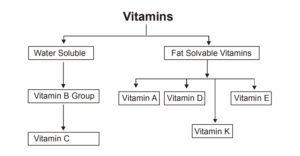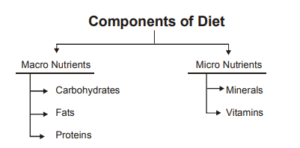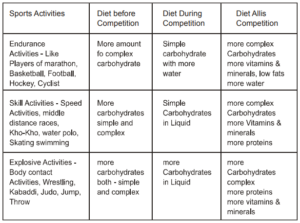Chapter – 2
Sports and Nutrition
In this post, we have given the Important Questions of Class 12 Physical Education Chapter 2 (Sports and Nutrition) in English. These Important Questions are useful for the students who are going to appear in class 12 board exams.
| Board | CBSE Board, UP Board, JAC Board, Bihar Board, HBSE Board, UBSE Board, PSEB Board, RBSE Board |
| Textbook | NCERT |
| Class | Class 12 |
| Subject | Physical Education |
| Chapter no. | Chapter 2 |
| Chapter Name | (Sports and Nutrition) |
| Category | Class 12 Physical Education Important Questions in English |
| Medium | English |
Very short Answer type Question (1 Mark Each)
Q.1 Mention the types of carbohydrate?
Ans. Two types simple & complex.
Q.2. List down simple types of carbohydrates?
Ans. Glucose, Galactose, Fructose, Maltose, Sucrose lactose.
Q.3 Stae complex carbohydrates types ?
Ans. Starch, Glycogen, Dextine, Cellulose are the types of complex carbohydrates.
Q.4 How many amino acids are found in proteins?
Ans. 23 amino acids and 9 are essential for us.
Q.5 State two Non Nutritive components of Diet?
Ans. Water & Fibers of Roughage coloured, flavoured.
Q.6 Which type of witamin B are found in diet?
Ans Vit. B1, B2, B3, B5, B6, B12, = 6 Vit. B.
Q.7 Mention two diseases which come from deficiency of protein?
Ans. Kwashiyorkan & Marasmars.
Q.8. Name the macro minerals which should be part of our diet?
Ans. Calcium, Iron, Sodium, Phasphorus, lodine, Potassium.
Q.9 List down four myths about dieting?
Ans.
- Healthy food is expensive.
- Dieting makes you loose weight.
- No fat diet is good.
- Don’t take milk immediately after eating fish?
Short Answer Type Question (3 marks each)
Q.1 Explain Balanced diet and it function in our body?
Ans. Balanced diet :- Balanced diet is that which is consisted of various constituents of food in accurate and appropriate quantity and quality according to the requirement of individual.
Functions of Balanced diet :-
- Sufficient energy is given by balanced diet.
- it helps individual to grow and develop to optimum level.
- Proper functioning of organs is done by balanced diet.
- It helps to repair or replace the worn out tissue.
- Balanced diet improves the defence of body.
- It helps to improve the overall health status.
- Balanced diet improves metabolism.
- it prevents deficiency diseases and maintain body weight thus overall efficiency of individual improves.
Q.2 Mention micronutrients which are important for body?
Ans. Vitamins and minerals are micro nutrients which are needed for our body in small amount but they have their importance
for body.
Vitamin A – This vitamin is also known as Retinol, needed for Normal growth & development.
Vitamin D- This is needed for formation of strong bones & teeth.
Vitamin E – It protect the cell membrane.
Vitamin K – It helps in blood clotting.
Water soluble Vitamin :- Vit. B. – Known as Thiamin. It helps in growth & development.
Vitamin C – It known as Ascorbic Acid. It helps to maintenance of ligaments.
Minerals : Iron :- It needs for formation of haemoglobin.
Calcium : – It resources for bone and teeth formation.
Phosphorus :- It makes strong teeth & bones.
Sodium :- It helps nervous system for better neuromuscular responses.
Lodine :- Deficiency causes Goitre.
Fluoride :- It helps teeth & nails.
Chloride :- It helps body to fight against infection.
Q.3 Write importance of protein for our body?
Ans. Proteins are basic structure of all living cells. Proteins are main components of muscles, tendons ligaments, organs glands, glands and all living body fluids like enzymes hormones and blood. Proteins are needed for growth & development of body. If helps to repair or replace the worn out tissues. It does not provide energy in normal routine whereas it acts as energy source only under extreme starvation. Proteins are required
for making blood, muscle, Nails, skin, hair and body parts and repair them when needed and are important in some situation like early development and maturation, pregancy lactation, or injury like burn etc.
Q.4 Write difference between types of carbohydrate simple and complex carbohydrate?
Ans.
- Simple carbohydrate give quick energy on the other hand complex carbohydrates release slow energy.
- The types of simple carbohydrates are Glucose, Glactose, Fructose Maltose, Sucrosse, Lactose. Complex are starch, Giycogen, Dexitine and Cellulose.
- Simply carbohydrate are called mono saccharides while complex are called polysaccharides.
- Complex carbohydrate are sweet in taste but complex are sweet in taste.
- They can be absorbed quickly other side complex carbohydrates takes time.
- Simple carbohydrates can be disolves in water but complete not.
Q.5. Mention five pitfalls of dieting
Ans. Following are pitfalls of dieting –
1. Extreme Reduction of Calories : – Person reduces the diet considerable which causes low level of energy thus person feels tiredness body aches.
2. Skipping meals :- People often skip meals to reduce weight where as in react meal they take large amoung of food.
3. Low energy Diet :- The person take diet without fats and less carbohydrates by which health is affected.
4. Not performing physical Activity :- People often consider that reducing diet for controlling weight but they neglect physical activities which is equally important for healthy Lifestyle.
5. Taking less Liquid :- People often think that drinking water or liquid makes them to gain weight which is wrong.
Q.6. How water is useful for us ? Explain Briefly?
Ans. Water in very useful component of our diet because. Blood comprises 90% of water with help of water through blood the nurtrients are carried to various deals of body. It important for secretion of waste producis. It regulators body temperature. Our body loses approximately 2% of our body
weight or water per day. We compensate thus loss of water by drinking water and by in take of food substances. It also functions as a lubricant keeps the skin moist and protect the body from shock. Amount 20% of water in take comes from food and remaining intake come from drinking water.
Q.7 How food intolerance is treated? What are systems Explain in brief?
Ans. Food intolerance is treated by medical help where we know the food which causes problem. Food intolerance is more common than food allergy. Food intolerance is a term used widely for varied physiological response associated with a particular food. The individual elements of certain foods that cannot be properly purposed and absorbed by our digestive system.
Systems of Food Intolerance :
Food intolerance can cause nausea, stomach pain, Diarrhoea, Vomitting, Flatulence Gas, Cramps heart burn, headache, irritability, or nervousness etc.
Q.8 What do you mean by bulimia Nervosa? Mention causes?
Ans. It is eating discorder characterized by binge eating and consuming a large amount of food in short time and after taking food persons try to get rid of one of consumed food, by vomiting taking a laxative or excessive exercise to reduce weight.
Two causes to Bulimai Nervosa.
(1). Purging Type – Individual which has this type of vomit (self induced), a use of laxatives or diuretics (water pills) to avoid gaining weight from binge.
(2). Non purging type – Individual engages self in regular fasting or excessive exercise.
- Abnormal levels of Hormones
- Dietary.
Q.9 Is fat useful or not useful for us and for body, explain?
Ans.
- Fats are store in body and are used as emergency sources of energy.
- Fats are important sources of energy for long duration activities and important for proper function of glands and other internal organs.
- It helps in transpotation of fat soluble Vitamins A,D.E.K.
- it help in blood clotting maintenance of skin & hair. Our diet should consist of 5 to 10% of fat higher in take of fat high risk of obesity and many heart diseases.
- Fats maintain body temperature and protect it from effect of external temperature.
- They make body soft & oily.
Q.10 Explain fat soluble vitamins and their sources and water soluble vitamins and their sources.
Ans.

Fat Soluble Vitamin
- Vitamin A Vitamin A is found in Cod liver Oils/animal Liver, york, Milk, & Milk products.
- Vitamin D Vitamin is founding milk, fish, Liver oils?
- Vitamin E Vitamin E is founding Green leafy Vegetables, Pulses, Liver eggs, cereals.
- Vitamin K In tomatoes, Potatoes, Spinach, cabbage, soyabean, fish, caulifiower wheat, eggs, meat, we can find vitamin K.
Water Soluble Vitamins
- Vitamin B Vitamin B – Sources include peas, perk Liver, Legumes
- B2 — We can find in liver, eggs, dark green vegetables, legumes, whole and enriched grain produced milk.
- B3 — Liver Fish, poultry meat, peanuts, whole & enriched grain products.
- B5 — Pork, meats whole grains, cereals legumes, green leaftly vegetables.
- B6 — Cereals, grains, legumas, vegetables, milk, cheese, eggs, fish liver, meat, flour.
- B12 — Fish, red meat, poultry, milk, cheese, eggs.
- Vitamin C Lemon citrus fruits like grapefruits, oranges, and kiwis, other good sources mango, papaya, pineapple.
Long Answer Type Question (5 Marks Each)
Q.1 What is Balanced Diet? How it is important for individual body?
Ans. Balanced diet in that diet which consisted of various constituents of food in accurate and appropriate in quantity and quality according to the requirement of an individual and helps in growth and development of our body.
Importance :
(i) Energy Resource :- It gives sufficient energy to body for various activities.
(ii) For optimum growth & Development :- It helps individual to grow and to achieve the aim of all round development.
(iii) Proper function of Organs :- By help of balanced diet every organ functions well and properly.
(iv) Faster Recovery :- It helps to repair and replace the worn out tissues thus faster recovery.
(v) Strong immune system :- It make better resistance power to body to make good immune system.
(vi) Improves fitness level :- It improves over all health states and resulting in fitness of body by preventing diseases.
(vii) Improves Metabolism :- Quality of metabolizing and thus efficient release of energy.
(viii) Prevents Deficiency Diseases :- It gives all necessry nutrients to body so deficiency diseases cannot takes place.
(ix) Maintaining body weight :- It helps individual to maintain proper body weight.
(x) Overall efficiency improves :- It improves all physiological systems of body then more of efficiency level of individual. In this way balanced diet is useful for as.
Q.2 What factors can be considered for making balanced diet?
Ans.
- Age :- Age plays great role in making diet for like in growing age a child need more protein but old aged people should avoid more proteins and fats but should take more minerals & vitamins
- Gender :- Sex difference causes variation in diet more caloric requirement to male & less for female.
- Profession :- Heavy physical activities work out needs more calories demand & less physical activities work out less calories demand.
- Body weight :- Obese person need fibrous food more, while slim or lean needs more protein.
- Specific Sports Diet :- Various sports need specific diet like long distance runner need more fat, contact body games player need more protein, explosing strength player needs more carbohydrates.
- Sufficient Roughages :- It is non nutritive but important, It consist fibers that found in fruits & vegetables.
- Pregnancy or feeding mother :- Pregnant mother needs extra diet – carbohydrates, protein, fat, vitamines, minerals etc.
- Diet During Health Problems :- Injured person should take more protein and minerals patients should be given diet full of mineral & vitamins.
- Seasonal Food :- Seasonal food is easily available and economical moreover the nutritional value is high.
- Climatic Condition :- The effects the diet like in hot places food should be has oily fried, while in coaster region the food should be more liquid.
- Natural Diet :- Natural sources of diet are early digested by body less polluted not synthetic food.
- Doctor’s Recommendation :- Diseased or sick person should take accords to doctor recommendation and patient ovoid fried food jaundice patience avoid protein.
- Eating habbits & social Customes :- They also effect the diet of individual some take low vegetables veg. other don’t take it so it is according to customs also.
Q.3 Why macronutrients should be essential part of our diet?
Ans. 
Macro Nutrients :-
Carbohydrates : They are main source of energy for almost all activates. They give quickly energy and less amount of carbohydrate in diet causes under nutrition and weight loss. Excess amount stored in livers and tissues from there they release the energy when in need.
Proteins :- Proteins are needed for growth & development of body. It helps and replace the worn out tissues. It does not provide energy under normal routine but give energy under extrme starvation, High intake of proteins creates overload over kidney and livers. Deficiency diseases are kwashioskar or maras mus.
Fats : Fats are emergency sources of energy and stored in body. Fats carry Vitamine, A,D,E,K. They are sources for energy for large activities. In proper functionary of glands and internal organs against the blood clotting, maintains the skin and important of proper functionary of glands and internals organs and it helps on blood clotting, maintains the skin and hair. Our diet should consiist of 10% of fat more intake more
risk of obesity and many heart diseases so this Nutrients and in highly proporation of diet and should be taken in proper amount according to need.
Q.4. Mention the types and effects of micro nutrients on our body?
Ans. Minerals & Vitamins are the micro nutrients of diet.
Function of Micro nutrients.
- Calcium :- It is required for bone and teeth formation, deficiently causes osteoporosis, Rickets and retorted growth.
- Iron :- it in required for formation of haemoglobin, deficiency leads to anaemai.
- Phosphorus :- It helps in making strong bones and teeth.
- Sodium :- It helps nervous system for better response, dificiency causes cramps and tiredness.
- Iodine :- It helps in proper growth & development of body, dificiency leads to goitre.
- Fluoride :- It helps teeth and nails.
- Chioride : – It helps body to fight against infection, proper functions of nervous system.
Vitamins :
- A – helps in normal growth & development of eyes and skin.
- D – Important for formation of strong bones & teeth.
- E – It protects the cell membrane and acts as antioxidant.
- K – helps in Blood clotting and heals wounds.
- B – Vit B1 for growth & development.
- B2 – helps in growth of RBC.
- B3 – Play important role in energy transfer, reactions in the metabolism of glucose, fat & alcohol.
- B5 – In involved in oxidation of fatty acids & carbohydrates.
- B6 – It helps in metabolism of amino acids.
- B7- it play key role in metabolism of lipids, proteins and carbohydrates.
- B9- Folic Acids Needed for normal cell division especially during pregnancy and infancy.
- B12 – It involved in cellular metabolism of carbohydrates proteins and lipids an helps in production RBC in bone marrow.
- C – helps in healing wounds it helps formation of growth & repair of bones, skin & connective tissues. It makes healthy teeth & gums.
Q.5. What is the effect of Diet on performance of sports persons?
Ans. Diet plays important role in sports perfromance. The following table will be followed for varioous activities.

Q.6. State four Myths of Dieling ?
Ans.
- 1 Myth : Low fat or no fat diet are good for you.
- Fact : This is not true cutting down saturated fat and eating unsaturated fat is good body needs fat for energy, tissue repair and transport Vitamins A,D,E,K.
- 2 Myth : Fasting Mkes you loose weight.
- Fact : True for short period by hinder weight loss. In long term it leans muscular tissues so exercise is recommended for weight loss.
- Don’t drink water while taking food. It digest food it don’t hamper metabolism so it is not true.
- 4 Myth milk should not be taken immediately after fish.
Fact : it is not true it will not give any allergy or irritation scienctist don’t think so. - Fruits and vegetables are more nutritive than cooked foods. Fact : Scientist discovered in recent years that cooking actually
boost levels of important compound in some fruits and vegetable and cooking also breaks down fiber, making it easier for your body to process. - Myth – Eat less nuts they are too fattening Fact : It is true that nuts contain a lot of fat but it is mostly the food kind. Recent research suggested that eating nuts as part of a healthy diet may even help you loose weight.
We hope that Class 12 Physical Education Chapter 2 (Sports and Nutrition) Important Questions in English helped you. If you have any queries about class 12 Physical Education Chapter 2 (Sports and Nutrition) Important Questions in English or about any other notes of class 12 Physical Education in English, so you can comment below. We will reach you as soon as possible…